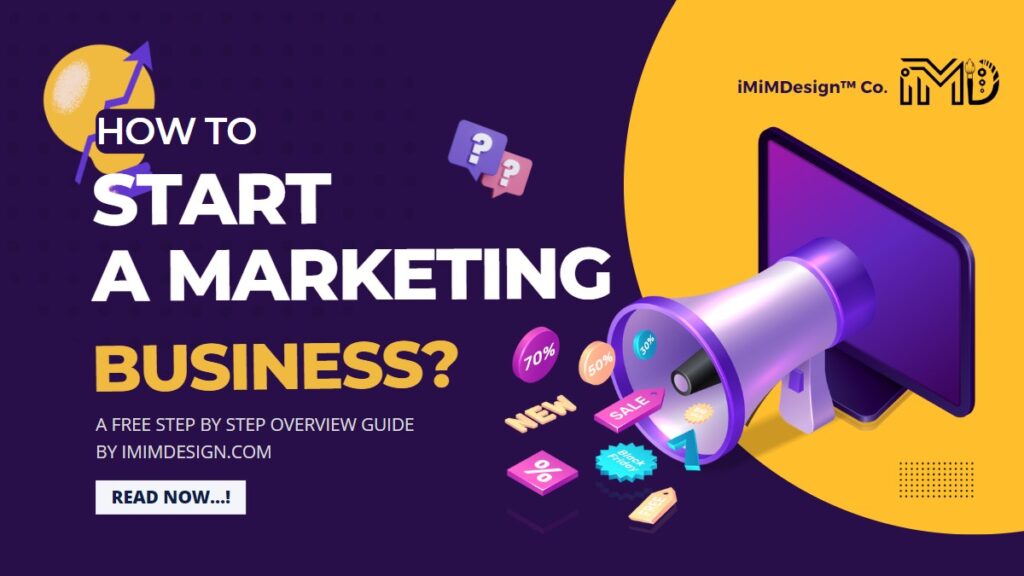How to start a marketing business? You read it right. Starting a marketing business can be an exciting and rewarding venture for those who are passionate about helping businesses grow and succeed. However, it can also be a daunting task, especially for those who are new to the industry. In this blog, we will provide step-by-step guidance on how to start a marketing business, from defining your niche to building your client base.
How To Start a Marketing Business?
Step 1: Define Your Niche
The first step in starting a marketing business is to define your niche. This is the area of marketing in which you specialize, and it will determine the types of clients you attract and the services you offer. There are many different niches in the marketing industry, including digital marketing, content marketing, social media marketing, email marketing, and more.
When choosing your niche, it’s important to consider your strengths, interests, and experience. What are you good at? What do you enjoy doing? What types of clients do you want to work with? Answering these questions can help you narrow down your options and choose a niche that aligns with your skills and interests.
Step 2: Develop Your Business Plan
Once you have defined your niche, the next step is to develop your business plan. This is a roadmap that outlines your business goals, target market, marketing strategies, financial projections, and more. A well-crafted business plan can help you stay focused and on track as you build your business.
When developing your business plan, consider the following:
- Market research: Research your target market, competitors, and industry trends. This will help you identify opportunities and challenges in the market and develop strategies to address them.
- Marketing strategies: Determine how you will reach your target market and promote your services. This may include social media advertising, email marketing, content marketing, networking, and more.
- Financial projections: Estimate your startup costs, ongoing expenses, and revenue projections. This will help you determine how much money you need to start and operate your business and when you can expect to break even and turn a profit.
Step 3: Register Your Business and Obtain Licenses and Permits
Before you can start operating your marketing business, you need to register your business and obtain any required licenses and permits. This will vary depending on your location and the type of business structure you choose (e.g., sole proprietorship, LLC, corporation).
To register your business, you may need to file paperwork with your state’s Secretary of State or Department of Revenue. You may also need to obtain a business license or permit from your local government. Check with your state and local government offices to determine what requirements apply to your business.
Step 4: Build Your Brand
Building a strong brand is essential for any marketing business. Your brand is what sets you apart from your competitors and communicates your value proposition to your target market. To build your brand, consider the following:
- Brand identity: Develop a brand identity that includes your business name, logo, colors, and overall visual style. This will help you create a consistent and recognizable brand that resonates with your target market. We provide graphic designing services. Let us design for you. Book an online appointment or view our services.
- Messaging: Develop a clear and compelling messaging strategy that communicates your unique value proposition to your target market. This may include your mission statement, elevator pitch, and key messaging points. Here’s your best b2b lead generation tools
- Website: Build a professional and user-friendly website that showcases your services, portfolio, and client testimonials. Your website is often the first impression potential clients have of your business, so it’s important to make it count. Get your website designed and developed at just Rs. 3,499 by us. Book an online appointment or view our packages.
-
Product on sale
 Web Design And Development Package 6Original price was: ₹27,999.00.₹19,999.00Current price is: ₹19,999.00.
Web Design And Development Package 6Original price was: ₹27,999.00.₹19,999.00Current price is: ₹19,999.00. -
Product on sale
 Web Design And Development Package 5Original price was: ₹20,999.00.₹14,999.00Current price is: ₹14,999.00.
Web Design And Development Package 5Original price was: ₹20,999.00.₹14,999.00Current price is: ₹14,999.00. -
Product on sale
 Web Design and Development Package 4Original price was: ₹16,999.00.₹10,999.00Current price is: ₹10,999.00.
Web Design and Development Package 4Original price was: ₹16,999.00.₹10,999.00Current price is: ₹10,999.00. -
Product on sale
 Web Design And Development Package 3Original price was: ₹10,999.00.₹7,999.00Current price is: ₹7,999.00.
Web Design And Development Package 3Original price was: ₹10,999.00.₹7,999.00Current price is: ₹7,999.00. -
Product on sale
 Maintenance for eCommerce 1 WebsiteOriginal price was: ₹1,000.00.₹399.00Current price is: ₹399.00.
Maintenance for eCommerce 1 WebsiteOriginal price was: ₹1,000.00.₹399.00Current price is: ₹399.00. -
Product on sale
 Web Design And Development Package 2Original price was: ₹9,799.00.₹5,999.00Current price is: ₹5,999.00.
Web Design And Development Package 2Original price was: ₹9,799.00.₹5,999.00Current price is: ₹5,999.00. -
Product on sale
 Web Design & Development – Package 1Original price was: ₹6,999.00.₹3,499.00Current price is: ₹3,499.00.
Web Design & Development – Package 1Original price was: ₹6,999.00.₹3,499.00Current price is: ₹3,499.00.
Step 5: Build Your Portfolio
Building a strong portfolio is key to attracting clients and demonstrating your expertise. Your portfolio should showcase your best work and demonstrate your ability to deliver results for your clients. When building your portfolio, consider the following:
- Select your best work: Choose the projects that best demonstrate your skills and expertise. These may be projects you completed for previous clients or personal projects you completed to showcase your abilities.
- Highlight your results: Include data and metrics that demonstrate the impact of your work. This could include increased website traffic, higher conversion rates, or improved brand awareness.
- Get testimonials: Collect testimonials from satisfied clients and include them in your portfolio. This can help build trust and credibility with potential clients.
Step 6: Start Marketing Your Business

Now that you have defined your niche, developed your business plan, registered your business, built your brand, and created your portfolio, it’s time to start marketing your business. This will involve a combination of online and offline marketing strategies, including the following:
- Social media marketing: Use social media platforms like LinkedIn, Twitter, and Facebook to promote your services, share industry insights, and engage with potential clients.
- Content marketing: Create valuable content (e.g., blog posts, eBooks, videos) that demonstrates your expertise and helps your target market solve their problems.
- Email marketing: Build an email list and send regular newsletters and promotional emails to stay top of mind with your target market.
- Networking: Attend industry events, join professional organizations, and participate in online forums to connect with potential clients and build relationships.
Paid advertising can be an effective way to reach your target market and generate leads for your business. Here are a few options to consider:
- Google Ads: Use Google Ads to display ads in search results and on websites that are part of the Google Display Network. You can target specific keywords, demographics, and geographic locations to reach your ideal audience.
- Facebook Ads: Use Facebook Ads to display ads on Facebook and its family of apps (e.g., Instagram, Messenger). You can target specific demographics, interests, behaviors, and geographic locations to reach your ideal audience.
- LinkedIn Ads: Use LinkedIn Ads to display ads on LinkedIn to reach a professional audience. You can target specific job titles, industries, and company sizes to reach decision-makers in your target market.
- Display Ads: Use display ads to display banners on websites that are part of ad networks. You can target specific demographics, interests, and geographic locations to reach your ideal audience.
Step 7: Build Your Client Base
With your marketing efforts in place, it’s time to start building your client base. Here are a few strategies to consider:
- Referrals: Ask your existing clients for referrals to other businesses in their network. Word-of-mouth referrals can be a powerful way to generate new business.
- Cold Outreach: Reach out to businesses in your target market and offer your services. This may involve sending cold emails, making cold calls, or reaching out on social media.
- Networking: Attend industry events, join professional organizations, and participate in online forums to connect with potential clients and build relationships.
- Content Marketing: Create valuable content (e.g., blog posts, eBooks, videos) that demonstrates your expertise and helps your target market solve their problems. This can attract potential clients to your business.
- Paid Advertising: Use paid advertising to generate leads for your business. You can target specific demographics, interests, and geographic locations to reach your ideal audience.
Step 8: Deliver Results and Build Relationships
Once you have clients, it’s important to deliver results and build strong relationships with them. This will help you retain your clients and generate repeat business, as well as referrals to new clients. Here are a few tips for delivering results and building relationships:
- Set clear expectations: Set clear expectations with your clients about what you will deliver and when. This will help you avoid misunderstandings and ensure that you deliver what your clients need.
- Communicate regularly: Communicate regularly with your clients to keep them informed about your progress and any updates or changes. This will help you build trust and credibility with your clients.
- Deliver quality work: Deliver high-quality work that meets or exceeds your client’s expectations. This will help you build a reputation for excellence and generate positive reviews and referrals.
- Be responsive: Be responsive to your client’s needs and concerns. Respond promptly to emails and phone calls and address any issues that arise in a timely and professional manner.
- Build relationships: Build strong relationships with your clients by getting to know them personally and understanding their business goals and challenges. This will help you provide more personalized and effective marketing solutions.
In conclusion, starting a marketing business can be a challenging but rewarding venture. By defining your niche, developing your business plan, building your brand, creating your portfolio, marketing your business, building your client base, and delivering results, and building relationships, you can build a successful marketing business that helps businesses grow and succeed. Don’t forget to follow us on Google News & share this guide!

Latest Posts






